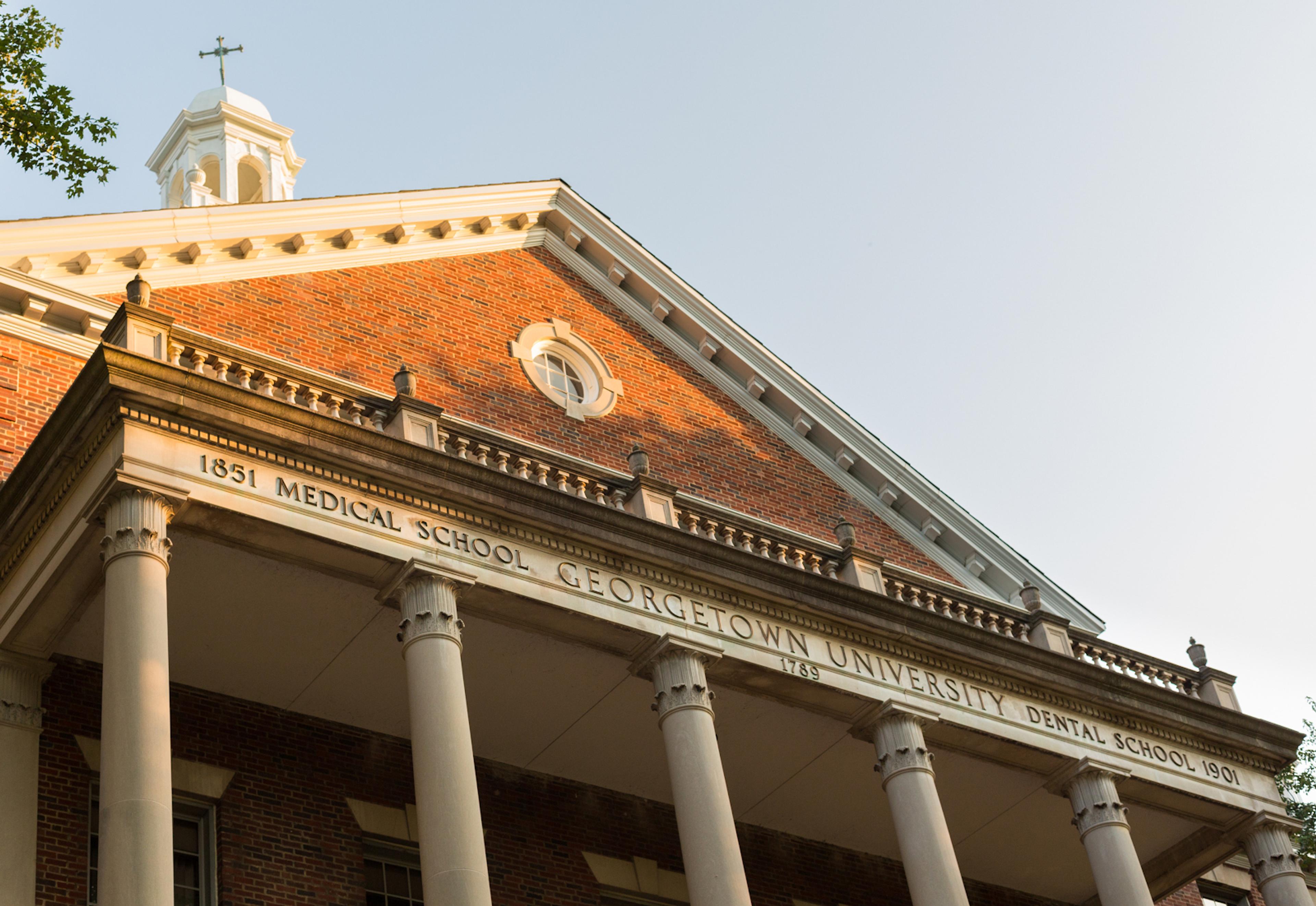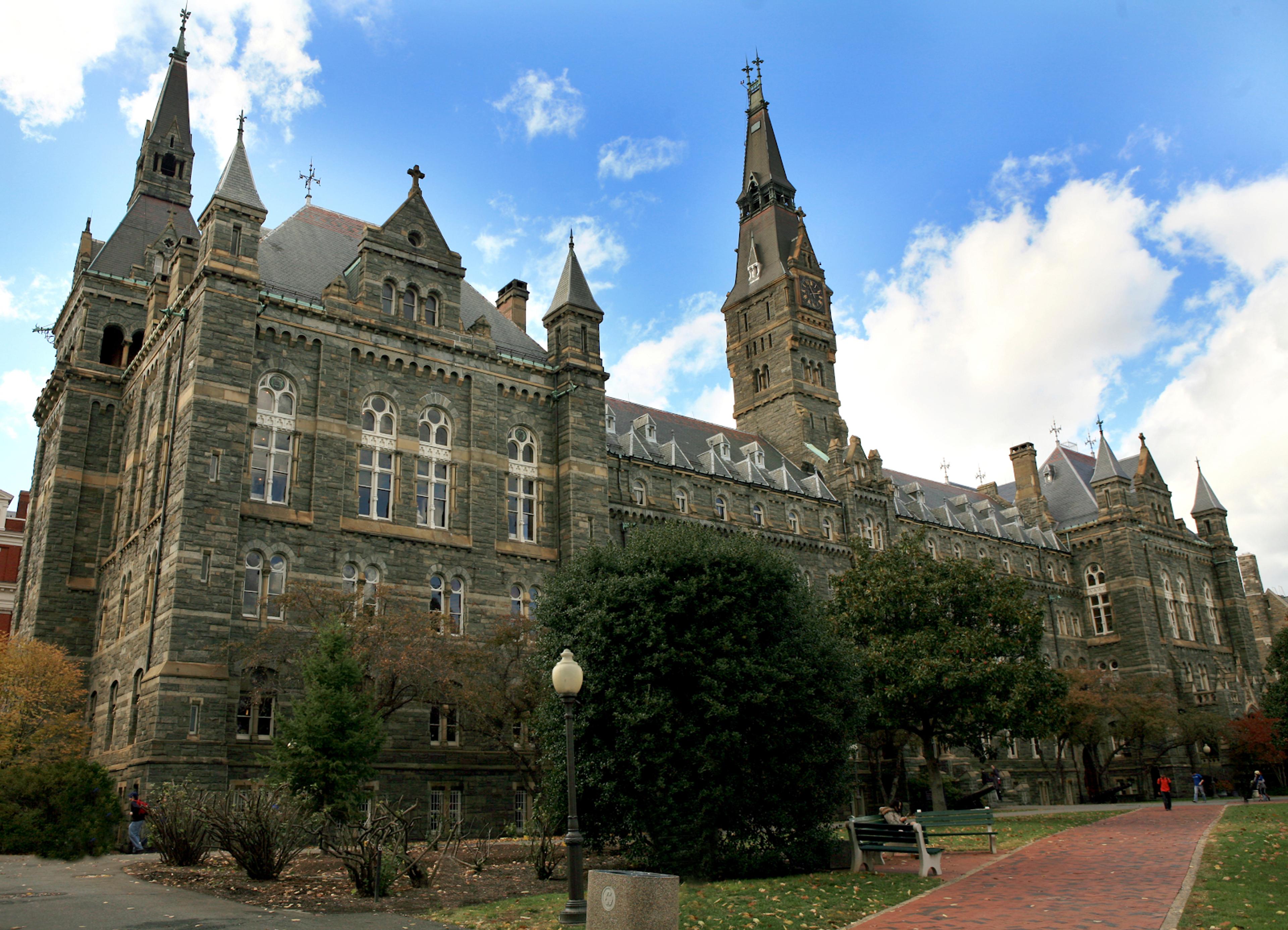How to Get Into Georgetown Medical School – Ranking, Acceptance Rate, & Requirements
Learn how to get into Georgetown Medical School with expert tips, admissions data, acceptance rate, and requirements for a strong, competitive application.
Posted June 13, 2025

Table of Contents
Georgetown Medical School is part of the Georgetown University Medical Center in Washington, D.C. Known for its Jesuit values and its focus on patient-centered care, the school trains future physicians to serve with compassion, integrity, and clinical skills. The Georgetown University School of Medicine combines rigorous academics with community engagement and a strong clinical education foundation in the Washington metropolitan area. The school attracts thousands of applicants each year and has a holistic review process.
Academic metrics are just part of what the admissions committee evaluates. Georgetown prioritizes future doctors who will uphold the school’s mission of cura personalis care for the whole person throughout their medical careers. A notable aspect of Georgetown Medical School is its clinical partnership with MedStar Health, which enhances the management of clinical care and provides education at Georgetown University Hospital.
This guide covers everything applicants need to know about how to get into Georgetown Medical School, including acceptance rate, requirements, curriculum structure, and cost.

How Hard Is It to Get Into Georgetown Medical School?
Georgetown University School of Medicine is highly competitive. For the M.D. Class of 2027, the school received 16,018 applications and offered 1,011 interviews. Of those, 201 students matriculated, resulting in an acceptance rate of 1.25%. This represents a drop from the previous year’s 2.84%, showing a more selective admissions cycle.
The admissions process is holistic. The admissions committee members evaluate academic records and MCAT scores alongside qualities that reflect Georgetown’s Jesuit mission of cura personalis, and care for the whole person. Applicants are expected to show a history of community service, leadership, strong communication skills, and sustained interest in patient care. The committee also looks for alignment with the school’s focus on social justice, public service, and equity in the current healthcare system.
Read: Georgetown University School of Medicine: Acceptance Rate Deep-Dive (2024)
Georgetown’s admissions committee assesses each applicant across several key areas:
- Academic achievement: Strength in science courses and overall GPA trends.
- Standardized testing: Competitive MCAT score (median 512), with individual section scores of 125+ preferred.
- Clinical exposure: Demonstrated interest in medicine through shadowing, scribing, volunteering, or direct patient care.
- Community service: Ongoing involvement that reflects a commitment to underserved populations or health-related advocacy.
- Leadership and teamwork: Experience that shows collaboration, responsibility, and the ability to contribute to a medical team.
- Life experiences: Unique challenges, backgrounds, or contributions that can enrich the student body and the Georgetown community.
- Cultural competency and ethics: A demonstrated understanding of moral or ethical dilemmas, cultural humility, and patient-centered care.
Being well-prepared for interviews is crucial, as it allows candidates to effectively showcase their strengths and passions, making a lasting impression on the admissions committee members.
Georgetown Medical School Rankings
As of 2025, Georgetown University School of Medicine is unranked in both Best Medical Schools: Research and Best Medical Schools: Primary Care, according to U.S. News & World Report. While many peer institutions are included in these categories, Georgetown currently does not appear on either list. Although Georgetown is unranked in the primary U.S. News categories, the school appears in several secondary indicators related to medical graduate outcomes:
| Ranking Category | Rank |
|---|---|
| Most Graduates Practicing in Health Professional Shortage Areas | #142 |
| Most Graduates Practicing in Primary Care | #158 |
| Most Graduates Practicing in Rural Areas | #147 |
Source: US News Georgetown University

Programs Offered at Georgetown University School of Medicine
Doctor of Medicine (MD) Program
The MD program at Georgetown is a traditional four-year medical education built around a three-phase curriculum. It combines a strong foundation in biomedical sciences with robust clinical training and opportunities for specialization. Students begin their clinical years in April of their second year, following an intensive pre-clinical period.
MD Curriculum Structure
| Phase | Focus Areas |
|---|---|
| Foundational Phase (Years 1–2) | Organ system-based modules, small group teaching, ethics, health systems, population health, and preparation for USMLE Step 1. Includes the Cura Personalis course and intersession modules. |
| Core Clinical Phase (Year 3) | Required clinical clerkships in internal medicine, surgery, pediatrics, OB/GYN, family medicine, psychiatry, and neurology. Rotations are completed at Georgetown University Hospital, MedStar Health sites, and other affiliated federal and community hospitals in the Washington metropolitan area. Students also complete a selective clerkship. |
| Advanced Clinical Phase (Year 4) | Acting internships, emergency medicine rotation, ACLS certification, clinical rotations in student-selected specialties, and 24 weeks of electives. Students complete USMLE Step 2 and prepare for the residency match process. |
Throughout the curriculum, there is a focus on patient-centered care, ethics, and population health. Students also participate in Longitudinal Academic Tracks, which allow exploration in targeted areas like health policy, bioethics, and medical education. The program's unique characteristics include its organ-based learning approach and the integration of Jesuit values, which shape the educational experience at Georgetown.
Longitudinal Academic Tracks
Georgetown’s Longitudinal Academic Tracks give students the ability to pursue distinction in focused areas while completing their core MD requirements. Students can enroll in up to two tracks.
Available tracks include:
- Diversity, Equity, and Inclusion in Medicine
- Environmental Health and Medicine
- Health Justice Scholar
- Healthcare Leadership
- Literature and Medicine
- Medical Education Research Scholar
- Population Health Scholar
- Primary Care Leadership
- Spirituality in Medicine
- Bioethics
Visit the Doctor of Medicine (M.D.) Program
Dual Degree Programs
Georgetown offers a range of dual degree options for students looking to integrate clinical training with advanced study in research, public health, or business.
| Dual Degree | Focus |
|---|---|
| MD/PhD | For students pursuing careers in academic medicine or translational research. Conducted jointly with the Biomedical Graduate Education program. |
| MD/MBA | Offered in partnership with the Georgetown McDonough School of Business, this degree prepares students for roles in healthcare management and leadership. |
| MD/MS | Supports students with interests in biomedical research, clinical investigation, or informatics. |
| MD/MPH | Combines medicine with public health training. Ideal for students pursuing work in health systems, community service, or public policy. |
| MD/MALS | A liberal studies option with flexible, interdisciplinary focus areas. |
Visit the Dual Degree Programs
Special Programs
In addition to its standard and dual-degree pathways, Georgetown also offers:
- Georgetown Experimental Medical Studies (GEMS) – A one-year post-baccalaureate program designed to support students from disadvantaged backgrounds in becoming competitive med school applicants.
- Early Assurance Program (EAP) – Available to Georgetown undergraduates, allowing eligible students to secure a spot in the MD program after sophomore year.
Visit the Special Master’s Program in Physiology
Master’s and Doctoral Programs
Offered through Biomedical Graduate Education, Georgetown’s Master’s Degree Programs, Doctoral Programs, and Certificate Programs prepare students for advanced study in medical sciences, clinical research, physiology, and more. These are separate from the MD program but frequently intersect with it through research collaboration and shared faculty.
Key programs include:
- Special Master’s Program in Physiology (SMP)
- Master’s in Clinical and Translational Research
- Doctoral programs in biochemistry, pharmacology, microbiology, and tumor biology
Visit the Doctoral Degree Programs, M.D./Ph.D. Program & Master’s Degree Programs

Admissions Requirements — Who Gets Into Georgetown University School of Medicine?
Georgetown University School of Medicine is among the most competitive medical schools in the U.S., with an acceptance rate of approximately 1.3% for the Class of 2027. The admissions process is holistic. The Committee on Admissions evaluates each applicant’s academic performance, clinical experience, research, community service, interpersonal skills, and personal background, especially as they align with Georgetown’s mission and its Jesuit philosophy of cura personalis (care of the whole person).
Georgetown accepts applications through the American Medical College Application Service (AMCAS). International and DACA applicants are welcome, provided they meet federal financial aid eligibility requirements or submit qualifying documentation.
Academic Requirements
- Hold a bachelor's degree from an accredited college or university prior to matriculation (minimum of 90 completed credit hours required at time of application)
- Complete all prerequisite coursework with appropriate lab components
- Submit valid MCAT scores taken within three years of the intended matriculation year (no exceptions)
- Complete both the AMCAS primary and Georgetown secondary applications
- Submit at least one committee letter (if available) or two individual letters of recommendation via AMCAS
- Complete a background check and immunization requirements upon admission
Required Coursework
- General Biology: 1 year with lab (8 semester hours)
- General Chemistry: 1 year with lab (8 semester hours)
- Organic Chemistry: 1 year with lab (8 semester hours)*Note: Biochemistry is recommended and may substitute one semester of organic chemistry (lab not required)
- Physics: 1 year with lab (8 semester hours)
- Mathematics: 1 semester of college-level math (Calculus not required; Statistics accepted)
Additional recommended coursework includes microbiology, genetics, embryology, biostatistics, computer science, physical chemistry, humanities, and behavioral sciences. Prerequisite substitutions are not accepted.
Note: If prerequisite coursework was completed more than five years ago, applicants must show recent academic engagement through a graduate or post-baccalaureate program.
MCAT Scores
A valid MCAT score is required from all applicants. Only scores from January 2022 to September 2024 (for 2025 matriculation) are accepted. No exceptions.If a future MCAT test date is listed on the AMCAS application, Georgetown will wait to review the file until those scores are available, provided they meet the September testing deadline. While there is no stated minimum, the average MCAT score for the most recent class was 512. Section scores below 125 are considered non-competitive.
GPA Requirements
Georgetown emphasizes the science GPA (BCPM) in evaluating academic readiness:
- Highly competitive applicants typically have a BCPM GPA ≥ 3.6
- Applicants with a BCPM GPA ≤ 3.0 are considered non-competitive
Note: The average GPA for the entering Class of 2027 was 3.78.
Letters of Recommendation
- One committee letter or packet (preferred, if available)
- Two individual letters (a maximum of five letters total may be submitted)
Note: Strong letters typically cover academic performance, clinical experience, and service work. Graduate students in science programs are encouraged to submit a letter from current graduate faculty. Letters must be submitted through the AMCAS Letter Service and assigned to Georgetown University School of Medicine.
Interview Process
Georgetown conducts virtual interviews by invitation only. About 6–7% of applicants are interviewed. Each interview is one-on-one and typically conducted by a faculty member or fourth-year medical student. Interviews focus on non-cognitive qualities including:
- Motivation for medicine
- Ethical decision-making
- Teamwork and leadership
- Fit with Georgetown’s mission
Note: Applicants who do not schedule their interview within two weeks of invitation will have their application withdrawn.
Technical Standards and Criminal Background Check
All admitted students must meet Georgetown’s technical standards to enroll. These include physical, cognitive, and behavioral capabilities required for safe and effective medical practice. A criminal background check and proof of immunization are also required prior to matriculation.
International and DACA Applicants
Georgetown welcomes applications from:
- Lawful permanent residents (green card holders)
- Refugees, asylees, and other eligible non-citizens
- DACA recipients
Georgetown Medical School Secondary Application Essays
The secondary application is required and includes several short essays. Past prompts have included:
- Why Georgetown?
- How will your life experiences contribute to the Georgetown community?
- Describe a time you faced a moral or ethical dilemma.
- Share any further information that might help the admissions committee.
Note: Essays are a chance to connect your values and experiences to Georgetown’s mission. Applicants should highlight a commitment to patient-centered care, intellectual curiosity, and alignment with the Georgetown University School of Medicine culture.
Georgetown Medical School Admissions Data (Class of 2027)
| Metric | Value |
|---|---|
| Total Applications | 16,018 |
| Interviews Offered | 1,011 |
| Matriculated Students | 201 |
| Acceptance Rate | 1.25% |
| Interview Rate | 6.31% |
| Yield Rate | 19.88% |
| Average GPA | 3.78 |
| Average MCAT | 512 |
| Female Students | 62.7% |
| Underrepresented in Medicine | 18% |
| Students With Advanced Degrees | 25% |
Read: Georgetown School of Medicine Class Profile
5 Expert Tips on How to Get Into Georgetown Medical School
1. Show How You Practice Cura Personalis
Georgetown values applicants who demonstrate care for the whole person, physically, emotionally, socially, and spiritually. Highlight experiences where you adapted your approach to meet individual patient needs, especially in underserved communities.
2. Write a Georgetown-Specific Secondary
Your secondary essays should reflect Georgetown’s Jesuit values, not generic goals. Reference programs like the Health Justice Scholar Track or Bioethics Track to show that you understand the school’s mission and culture.
3. Prioritize Longitudinal Clinical Experience
Georgetown prefers applicants with consistent, hands-on clinical roles in the U.S. Focus on quality and depth of experience over quantity, especially if your work reflects a patient-centered approach.
4. Connect Research to Patient Impact
Research isn’t required, but Georgetown values work that improves patient care or informs health policy. Understanding the current health care system and being able to articulate the biggest problems within it during interviews is crucial. Emphasize how your research experience helped you understand the current healthcare system or public health issues.
5. Choose Recommenders Who Know You Personally
Your letters of recommendation should go beyond academics. Pick writers who can speak to your maturity, service orientation, and ability to handle moral or ethical dilemmas traits the admissions committee looks for.
The Bottom Line
Getting into Georgetown University School of Medicine is difficult, but strong applicants stand out through more than just high GPAs and MCAT scores. Developing important qualities such as empathy, professionalism, and effective communication is crucial. Georgetown looks for students who show a lasting commitment to patient care, community service, and the values of cura personalis. A competitive application highlights well-rounded clinical experience, ethical decision-making, leadership, and an understanding of how healthcare impacts diverse communities. Medical students develop essential values, skills, and knowledge throughout their training, which aligns with Georgetown’s mission. If you can connect your life experiences and goals to Georgetown’s mission and demonstrate readiness for its rigorous program, you’ll be in a much stronger position to earn an interview and ultimately a spot in the incoming class.
Get Into Georgetown With Expert Advice
Work one-on-one with a medical school admissions coach to build a strong application. Get help with everything from your MCAT prep to your personal statement and secondary essays. Find the right coach to help you get accepted. Browse Medical School Admissions Coaches here.
Related Articles
For more resources on crafting a successful medical school application, check out the articles below:
- Med School Scholarships: A Comprehensive Resource Guide
- How Many Medical Schools Should I Apply To? A Strategic Approach
- NYU Grossman School of Medicine: Admission Requirements and Application Process
- The Best Medical School Extracurriculars for Admission
FAQs About Georgetown Medical School
How hard is it to get into Georgetown Medical School?
- Georgetown University School of Medicine is highly selective. For the Class of 2027, the acceptance rate was 1.3%. Out of over 16,000 applicants, just over 1,000 were invited to interview, and 201 students matriculated. The admissions process is holistic, with a strong emphasis on academics, clinical experience, service, and alignment with the school’s Jesuit values.
How prestigious is Georgetown Medical School?
- Georgetown is one of the most applied-to medical schools in the U.S. While it is currently unranked by U.S. News & World Report in research and primary care, the school has a long-standing reputation for strong clinical training, a patient-centered approach, and a commitment to ethics, service, and diversity. It is known for producing skilled, compassionate physicians.
What MCAT score is required for Georgetown?
- There is no formal MCAT cutoff, but a competitive applicant typically has a score of 510 or higher. The average MCAT for the most recent incoming class was 512. Section scores below 125 are considered non-competitive.











